
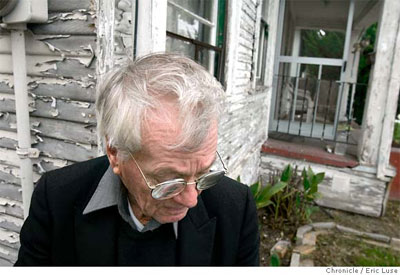
Dave Black has played with Duke Ellington and many others in his long
career.
Dave Black began grooving at the age of 3, banging on a toy drum sent by a Scottish
auntie, tin cans, cups and anything else he could get his sticks on. Seventy-four years
later, the masterly percussionist who powered Duke Ellington's orchestra in the
mid-1950s is still at it, playing with remarkable fire and finesse despite a series of
maladies that might have silenced lesser men.
A Philadelphian who flipped for Gene Krupa and the other, even
more dazzling big-band drummer who followed, Buddy Rich, Black took over the Ellington
drum chair from his friend Louie Bellson in '54. But he had to quit that illustrious
band after two years when he was stricken with polio and laid up for months in a
Portland hospital.
After he recovered, Black moved to the Bay Area with his wife,
Olga, a waitress he'd met at San Francisco's long-gone Downbeat club. He became a
ubiquitous presence in these parts over the ensuing decades, playing with everyone
from Frisco jazz trumpeter Bob Scobey, with whom he toured for eight years, to pianist
Earl Hines and many other touring and resident musicians.
A protean percussionist equally at ease playing swing or backing
Charlie Parker, Black made his living doing club dates and casuals and teaching tricks
of the trade -- particularly his deft high hat and brush stuff -- to other drummers.
But he was forced out of action again a decade ago with a painfully debilitating
illness that doctors could never diagnose. He shrank to about 90 pounds, was in a
wheelchair and was prepared for the final curtain.
Then the pain disappeared, and within a few weeks, little Davey
Black was back and swinging. For the past year, he's been wowing crowds at Uva in
Napa, a popping downtown restaurant where he's featured Friday nights with reedman
Philip Smith's Gentlemen of Jazz quartet.
"You're looking at the luckiest guy on this goddamn planet,
man,'' says Black, a slight, exuberant man with boyish blue eyes gazing out through
thick glasses. "I can still play, and I have good friends. To have my health and
be able to play at my age -- it takes a lot of energy for an old man, and I'm lucky to
have it.''
His energy and skill would be noteworthy in a drummer of any age.
The other night at Uva, he built a bracing solo on Basie's "Jumpin' at the
Woodside'' with tap-dancing high-hat melodies and rumbling bass rolls, splashing
cymbals and ricocheting cross rhythms. The crowd responded with whoops and shouts and
a roaring ovation.
There's a nice vibe at Uva, where the walls around the bar are
lined with photos of Peggy Lee, Lionel Hampton and other jazz artists, and a picture
of Willie Mays, standing in front of Seals Stadium upon the Giants arrival in San
Francisco in '58, hangs in the men's room. The people who run and patronize the place
accord Black the appropriate respect. Padrone Sean Pramuk not only sets up the man's
drums for him but also puts him up at his home every Friday night so that Black, a
diabetic with diminishing eyesight (he recently had laser eye surgery) doesn't have to
drive at night. He motors to and from Napa every week in the black 1990 Cadillac that
Smith laid on him as a gesture of friendship and admiration.
"You can't believe how they treat me there. It's the end,''
says Black, sitting on a couch in the funky little Alameda house he's rented for 15
years. In his khakis, blue blazer and black wingtips, the gray-haired gent suggests an
aging professor who spices his speech with '50s jazz slang.
Black's pad is weather-worn on the outside and a warm
clutter of objects within. An old photo of him with Ellington sits on the coffee
table alongside a pack of Regal Tip 7A drumsticks. Ties hang from doorknobs. There
are photographs of his late wife and son on the fireplace mantel and walls, along
with pictures of Black with old drummer friends such as Bellson and the late country
and western drummer Larry London.
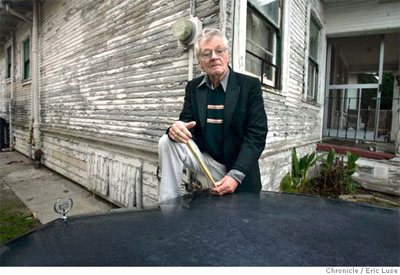
Neither grief nor illness keeps drummer Dave Black from keeping time, beating odds.
Dave Black, in front of his home in Alameda, drives a 1990 Cadillac.
The small adjacent bedroom contains an ancient practice set -- "A guy invented
this years ago so the neighbors wouldn't shoot you,'' Black says with a laugh -- and
the Slingerland drums he practices on daily. The set is rigged with two pedals on
the bass drum so he can play the rolls that used to require two bass drums (Bellson
brought the double-bass setup into the Ellington band, and Black followed suit when
he joined).
Black learned his dazzling double-bass roll from a Philly tap
dancer named Jimmy Cooley, with whom he used to jam.
"When I came up in Philadelphia, drummers and tap dancers
were one and the same. We all used to hang together,'' Black says. "We used to
scrape up 6 bucks and rent a hall -- you could rent a hall for 6 bucks -- and he and I
would go all day, just riffing.''
Black, whose father was a jack-of-all trades who worked in Navy
yards and hosiery factories, was already hooked on drums when a cousin took him to
hear Krupa when he was 13. He'd been playing Krupa's records dozens of times a day
trying to learn the solos. Sitting in the balcony that night, seeing his idol live, he
got a surge of inspiration.
"I could hardly walk out. My knees were shaking,'' Black
recalls. "He had so much stuff, and he was such a showman. When I saw him in that
black tuxedo in that white light, whoa! I became good friends with him later. Then
Buddy Rich came on the scene, and that was the end of the barrier for drummers, man.
There was nobody like him in terms of what he could do. Like somebody from another
planet.''
Black, who won a drum contest put on by Krupa in '48, studied for
several years with an old-time vaudeville musician named Jess Altmiller, "a big
fat guy'' who played in pit orchestras and was adept on all kinds of percussion
instruments. Black jobbed around Philly with various groups before making a splash
playing shuffles and boogies with an early '50s rock group called the Aristocrats.
A drummer friend brought Bellson to hear Black with the band.
Bellson was impressed with the kid's playing, and the two became lifelong friends
(Bellson, who lives in San Jose, is still cooking at 80). In late '53, Bellson told
Black he was leaving Ellington and urged him to come up to New York to audition for
his job. Sitting in with the Ellington band at Basin Street, Black fit right in, and a
couple of months later he got a call from the maestro.
"Listen, Dave,'' Ellington said, "the boys in the band
liked what they heard, and so did I. We want to hear more.'' Ellington flew Black to
Boston for some shows, but didn't offer him the gig permanently until Black joined the
band a few months later at New York's Paramount Theater. In the interim, Black played
in the house rhythm section at the Blue Note in Philadelphia, backing artists like
Bird, Buddy DeFranco and Zoot Sims.
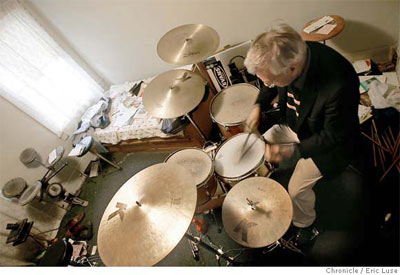
The old master can still surprise and impress younger drummers with his tricks of the
trade: deft high hat and brush techniques.
Although rooted in swing, Black was listening to Parker and Gillespie and took
naturally to modern jazz. He could play those frenetic bop tempos.
"I was young and fiery then, man,'' says Black, who really
came into his own touring and recording with Ellington in 1954-55. "He was a
wonderful, relaxed man who let you play the way you wanted to play, and did his
arrangements with your style in mind,'' Black says. Billy Strayhorn, Ellington's close
collaborator, wrote the drum feature "Gonna Tan Your Hide'' for Black.
That number still kills Steve Smith, the esteemed drummer who
made his fortune with the rock group Journey and now leads the fine fusion group Vital
Information.
"That solo is really ahead of its time,'' says Smith, a
passionate student of music history who has the tune on his iPod, along with classic
solos by Krupa, Rich and others from a 1955 compilation called "Hi-Fi Drums.''
"Dave plays some great boogaloo Latin rock-type feels that
were really popularized later by Sandy Nelson (the studio session player whose 1959
hit "Teen Beat'' used those rhythms). There's an incredibly fast bass drum roll,
and then he slowly starts with his hands on top of that and speeds his hands up, which
takes a lot of coordination. I don't know of anybody else who was doing anything like
it those days. And there's some really swinging polyrhythms going on, too.''
Smith is one of many younger drummers whom Black has
befriended. On a recent visit, the older musician "showed me some fantastic
high-hat tricks,'' Smith says. "After all these years, even though he's got
some arthritis (and carpal tunnel problems, for which he's had two surgeries), he's
still got great chops.''
What's his secret?
"I don't know,'' Black says. "My father died when he was 53. Maybe playing
keeps me young. I get to know all the new young drummers. I'm in the swing of things
all the time, rather than sittin' around at home eatin' crackers and cheese at
night.''
Every year, he attends the big National Association of Music
Merchants convention in Anaheim, checking out the new drum products, schmoozing with
old friends and showing some of the rock kids his subtle brush technique.
"I try to listen to everybody,'' Black says. "I don't
put anything down. If you don't understand it, don't say nothin'. You can get
something from everybody, man.''
Black lost his wife five years ago. A lovely pastel portrait of
Olga hangs on the wall. His son, heavy metal drummer Lawrence "Brintley'' Black,
died five months ago of complications from diabetes.
"That was a real blow, when the kids go before you do,''
says Black, whose other son, Brian, works as a train dispatcher in Texas.
But Black has his music, and that keeps him going. The joyous
response he gets from the crowds at Uva lifts him up.
"People are amazed I can do all that stuff,'' Black says.
"It's the age thing. When I was a great drummer at 24, nobody gave a goddamn. Now
that I'm old and can hardly sit up, they say, 'Jesus, did you see that old man play?'
''
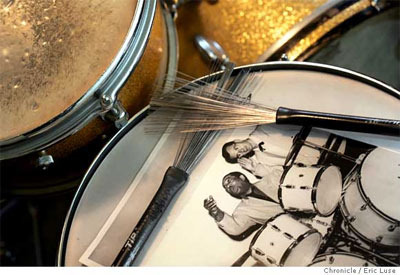
Dave Black has played with Duke Ellington and many others in his long career.
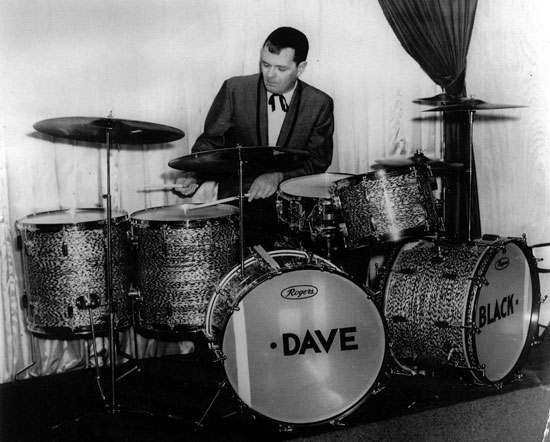
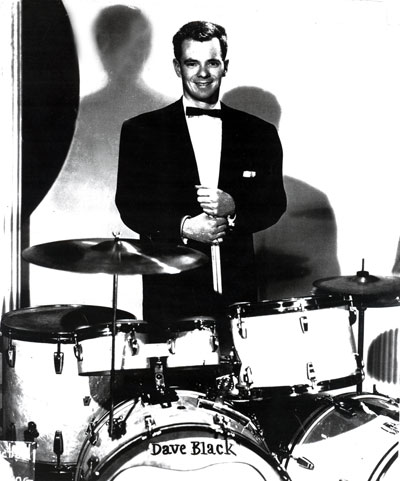
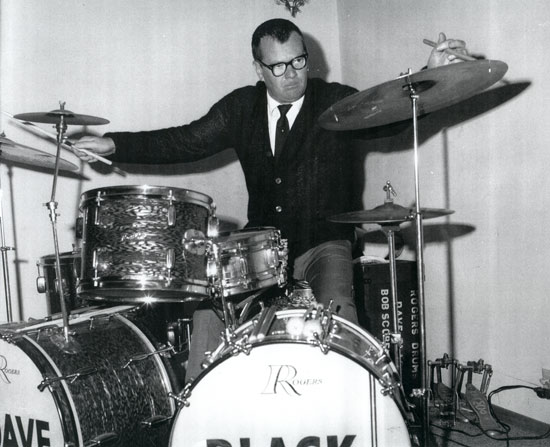
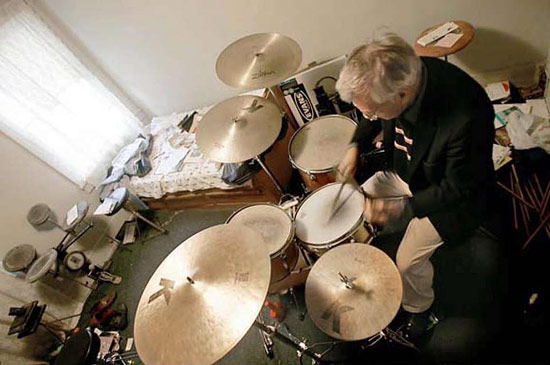
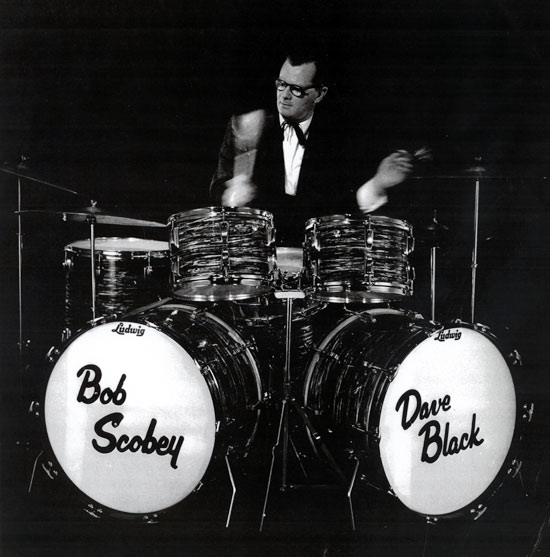
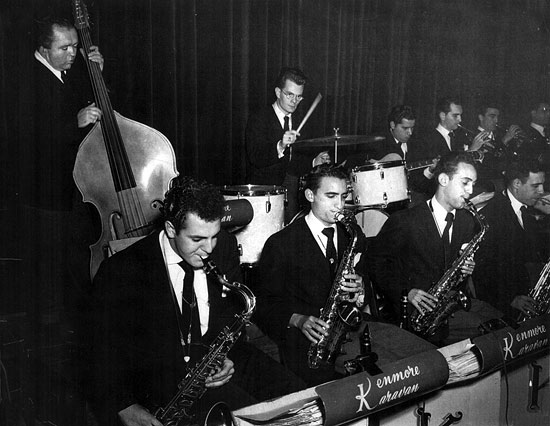 Kenmore
Karavan Orchestra
Kenmore
Karavan Orchestra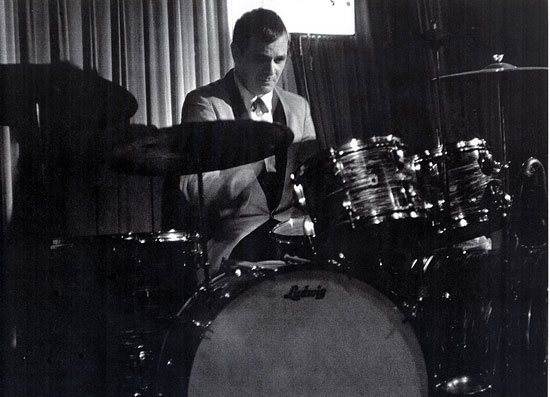
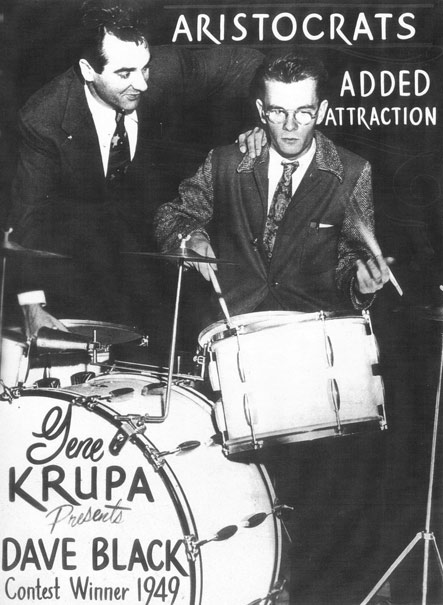
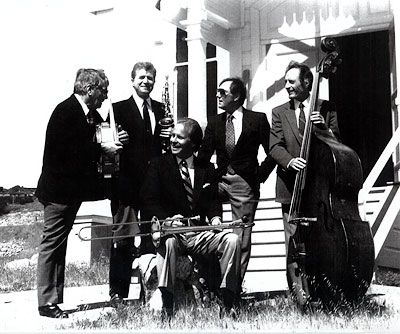 Rex
Allen Band
Rex
Allen Band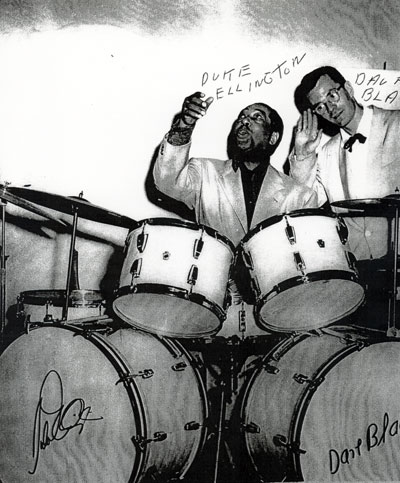 Duke
Ellington - Dave Black
Duke
Ellington - Dave Black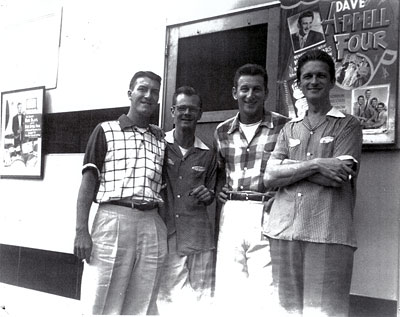 ...played with DAVE APPELL for one year
...played with DAVE APPELL for one year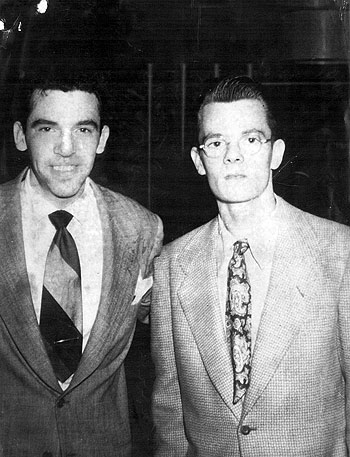 Buddy
Rich - Dave Black
Buddy
Rich - Dave Black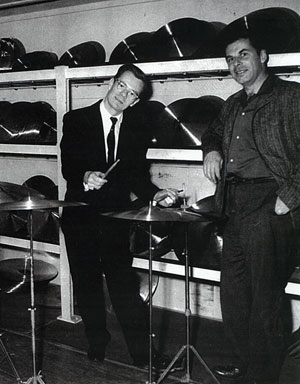 ...at
the Factory:
...at
the Factory: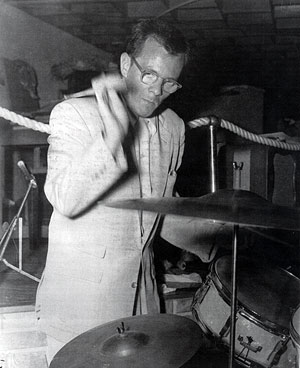
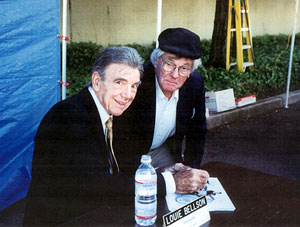 Louie
Bellson - Dave Black
Louie
Bellson - Dave Black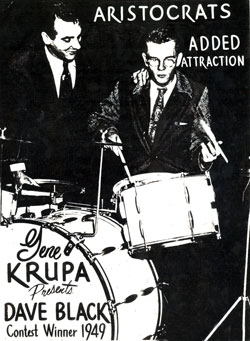 Gene
Krupa - Dave Black
Gene
Krupa - Dave Black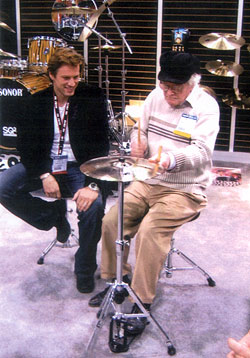 Thomas
Lang - Dave Black
Thomas
Lang - Dave Black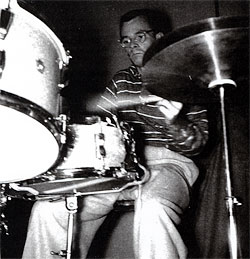 thanks
for your visit!
thanks
for your visit!








